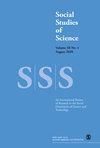Sensory labor as un/knowing in a waste composition study: Identifying a chain of translation.
IF 2.7
2区 社会学
Q1 HISTORY & PHILOSOPHY OF SCIENCE
引用次数: 0
Abstract
To keep track of the types and proportions of waste produced in society, various waste composition studies are carried out around the world. Through ethnographic fieldwork, this article examines how statistical knowledge about waste was produced in the context of a waste composition study organized by a Finnish waste management company. We follow a chain of actions involving sensory labor to show how waste was translated into numerical knowledge. By shedding light on the sensory labor of producing knowledge on waste, we contribute to social scientific waste research, especially by illustrating how the interplay between senses and waste-as matter that can evoke strong sensations-challenges the possibilities of translating waste into numerical knowledge. We also show how these difficulties are, in turn, managed to create accurate data for the purposes of waste policies. In addition, our study contributes more widely to the public discussion on waste policies by highlighting the role of sensory labor as crucial for the operation of the circular economy.感官劳动在废物成分研究中的认知:翻译链的识别。
为了追踪社会产生的废物的种类和比例,世界各地进行了各种废物组成研究。通过民族志田野调查,本文考察了在芬兰废物管理公司组织的废物组成研究的背景下,如何产生有关废物的统计知识。我们遵循一系列涉及感官劳动的行动来展示浪费是如何转化为数字知识的。通过揭示产生关于废物的知识的感官劳动,我们为社会科学废物研究做出了贡献,特别是通过说明感官和废物之间的相互作用(作为可以唤起强烈感觉的物质)如何挑战将废物转化为数字知识的可能性。我们还展示了如何处理这些困难,进而为废物政策的目的创建准确的数据。此外,我们的研究通过强调感官劳动在循环经济运行中的关键作用,为公众对废物政策的讨论做出了更广泛的贡献。
本文章由计算机程序翻译,如有差异,请以英文原文为准。
求助全文
约1分钟内获得全文
求助全文
来源期刊

Social Studies of Science
管理科学-科学史与科学哲学
CiteScore
5.70
自引率
6.70%
发文量
45
审稿时长
>12 weeks
期刊介绍:
Social Studies of Science is an international peer reviewed journal that encourages submissions of original research on science, technology and medicine. The journal is multidisciplinary, publishing work from a range of fields including: political science, sociology, economics, history, philosophy, psychology social anthropology, legal and educational disciplines. This journal is a member of the Committee on Publication Ethics (COPE)
 求助内容:
求助内容: 应助结果提醒方式:
应助结果提醒方式:


